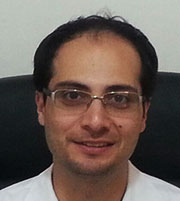
An introduction to our September 2018 articles:
Electronic Physician has recently published the articles for September 2018. The theme of our year 2018 publications has been Randomized Controlled Trials as we have published 36 RCTs from January to September 2018. However, the theme of our September publication is “Meta-analysis” as we have an exceptional meta-analysis in September.
In September 2018, the journal presents six articles written by scholars from Saudi Arabia, Iran, Turkey, and Egypt. In an informative “Systematic Review and Meta-analysis”, Professor Dr. Mohsen Mohebati and his colleagues from the Atherosclerosis Prevention Research Center, the Metabolic Syndrome Research Center, and the Cardiovascular Research Center of Mashhad University of Medical Sciences (Iran), studied the association between echocardiographic epicardial fat thickness (EFT) and the presence or absence of coronary artery disease (CAD). According to the findings of this meta-analysis, the echocardiographic EFT in subjects with CAD was significantly higher than that of those without CAD. The measurement of echocardiographic EFT seems to be an acceptable strategy for risk stratification of heart diseases considering ease of use, cost-effectiveness and non-exposure characteristics, compared to other imaging interventions.
It is noteworthy to mention that their study has followed the Preferred Reporting Items for Systematic Reviews and Meta-Analyses: The PRISMA Statement (http://www.prisma-statement.org). PRISMA is an evidence-based minimum set of items for reporting in systematic reviews and meta-analyses. PRISMA focuses on the reporting of reviews evaluating randomized trials, but can also be used as a basis for reporting systematic reviews of other types of research, particularly evaluations of interventions.
There is also an educational experiment among our September 2018 articles. Professor Dr. Mohammad Nazer and his team of psychology and psychiatry experts from the Non-Communicable Diseases Research Center and the Social Determinations of Health Research Center affiliated with Rafsanjan University of Medical Sciences are the authors of the educational experiment where they examined the effectiveness of neurofeedback training (NFB) on verbal memory, visual memory and self-efficacy in students. Their findings suggest NFB is effective in improving verbal memory and some dimensions of visual memory. However, further studies are needed in order to achieve better results. Two noteworthy points about this study are that the team used Analysis of Covariance for controlling over potential confounding variables and they used “Kim Karad visual memory test,” “Numerical – verbal memory test” and “Morgan-Jinks self-efficacy scale” as the main instruments of their study.
In September, we also have an instrument-validation study by Hakan Yaman and Zeynep Ünal from Akdeniz University (Antalya, Turkey). In this research, they validated the PRISMA-7 questionnaire in community-dwelling elderly people living in Antalya, Turkey. Their article also has further educational value as it can be used as a sample of instrument-validation studies for PhD students.
In a short report under the supervision of Professor Hyder Osman Mirghani from University of Tabuk (Kingdom of Saudi Arabia), they present the relationship of body mass index (BMI) to sleep duration, and current smoking among medical students. According to their results, BMI was higher among smokers and those with shorter sleep duration, although there was no association between BMI and other students’ characteristics.
In a prevalence study by Professor Dr. Mohammed Salih Mahfouz from Jazan University (Kingdom of Saudi Arabia) and his team of scholars from Saudi Arabia and Al-Azhar University (Cairo, Egypt), they described the prevalence and factors associated with H. pylori infection in Saudi patients with dyspepsia.
Finally, Professor Dr. Manal Alammari, and Professor Dr. El-Sayed Nawar from the Oral and Maxillofacial Rehabilitation Department (King Abdulaziz University, Jeddah, Kingdom of Saudi Arabia) are the authors of a cross-sectional study in which they researched Inter-rater and intra-raters’ variability in evaluating complete dentures insertion procedure in senior undergraduates’ prosthodontics clinics. As a consequence of their research, a simple objective and detailed method to evaluate complete denture insertion procedure was developed, and it showed that both intra-rater and inter-rater agreement were excellent for the analytical method, and might overcome errors and subjectivity in evaluation that result from the limitations of the global method. Results recommend suitability of using the analytical evaluation to improve reliability between raters.
Electronic physician
September 13, 2018
Click here to read September 2018 articles
Air Force 1Asics Onitsuka Tiger



















